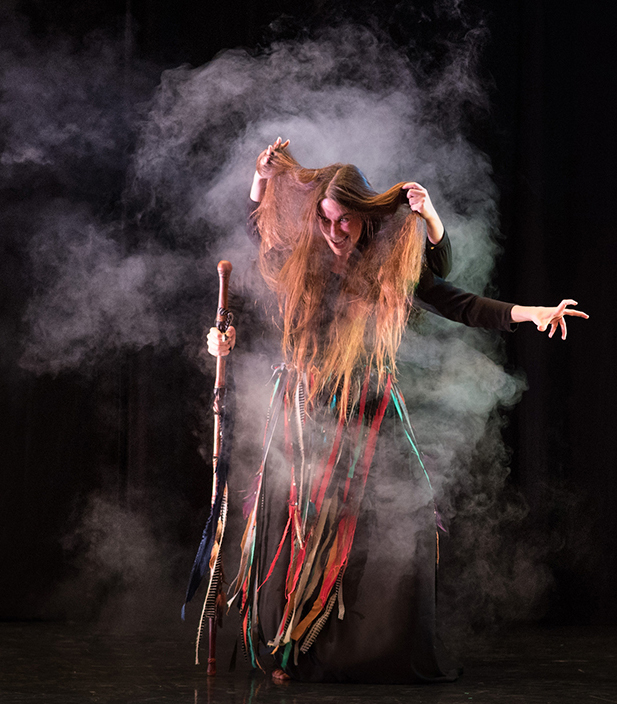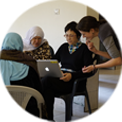 Linguistic research has firmly established that conventionalized sign languages of deaf communities are full, complex languages with their own linguistic structure. But the origins of these rich visual languages are gestural and mimetic, and these properties lie in waiting beneath the surface, to be recruited by skilled signers in the service of creative expression. Our Sign Language Research Laboratory project aims to tap the full range of expression of the hands, face, and body, to more deeply explore the Grammar of the Body.
Linguistic research has firmly established that conventionalized sign languages of deaf communities are full, complex languages with their own linguistic structure. But the origins of these rich visual languages are gestural and mimetic, and these properties lie in waiting beneath the surface, to be recruited by skilled signers in the service of creative expression. Our Sign Language Research Laboratory project aims to tap the full range of expression of the hands, face, and body, to more deeply explore the Grammar of the Body.
The Laboratory is a practice-based artistic research group that began operating in 2014 as part of the Grammar of the Body (GRAMBY) Research Project. Most of the nine Theatre Lab actors are deaf and hard-of-hearing, and all of them use Israeli Sign Language (ISL) on a daily basis. We use ISL combined with expressive gestures and physical theatre in order to develop a form of visual theatre that is aimed at both deaf and hearing spectators. Unlike most theatres of the deaf around the world, our work is not scripted and is largely based on improvisation. We play with the mimetic component of ISL, highlighting facial expressions and other forms of bodily expression, and experimenting with gestures that are normally performed and understood by hearing and deaf people alike. We draw our inspiration from deaf culture and from the work of 20th Century theatre experimentalists such as Meyerhold, Artaud, Grotowski and the Living Theatre, who were all searching for a theatre language that does not depend entirely on dialogue and spoken word. Our work has benefited greatly from workshops on Indian dance theatre led by Osnat Elkabir and on sign language poetry and performance techniques led by Peter Cook and Kenny Lerner.
The laboratory is named after the deaf god Ebisu, one of the Seven Gods of Fortune in Japanese Shinto belief. We are inspired by the jovial and auspicious deaf god and are proud to use its name for our Sign Language Theatre Lab.
Ebisu Sign Language Theatre Laboratory Introduction trailer Hebrew, English
Theatre Performance Trailers:
Articles:
Sandler, W, Citron, A, Bar, N, Belzitsman, G. to appear. Sign Language and Deaf Culture: The Ebisu Sign Language Theatre. In G. Zinman and T. Most (Eds.), Deaf and Hard of Hearing People: Interdisciplinary Perspectives. (Hebrew)
סנדלר, ו., ציטרון, ע., בר, ננה. התקבל לפרסום. שפת הסימנים ותרבות החירשים ביצירה של תיאטרון אביסו. בתוך ״חירשים וכבדי שמיעה: פרספקטיבה רב תחומית״. ג. צינמן , ט. מוסט (עורכים).
Sandler Wendy. (August 20, 2018). The Ebisu Sign Language Theatre Laboratory and the Grammar of the Body
Press:
Forget What You Thought About Sign Language
TV story about It's Not About Ebisu (captioned in Hebrew and English) (2 minutes)
French TV story about International Deaf Arts Festival with Ebisu (captioned in Hebrew and English) (3 minutes)
Presentations:
The Composition of a Theatrical Sign Language. 2019. Keynote talk at Cologne, Germany international conference on multi-modality
Belsitzman, Gal, Citron, Ati and Sandler, Wendy. (March 9, 2017). The Ebisu tool kits: Realizing the potential of the expressive body. GRAMBY Workshop.
Sandler, Wendy. (2016). A thespian grammar of the body. EVOLANG 11.
Research and performance team:
Researcher: Gal Belsitzman
Director and Senior Researcher: Atay Citron
Associate Directors and Producers: Michal Vaknin, Adva Weinstein
Actors: Shoval Ben Ze’ev, Lee Dan, Iliya Markov, Ella Okhotin, Alaa Sarsour-Sayad, Nurit Shalom, Adis Tesffa Sibaht, Alon Zenou, Golan Zino
Sign Language Interpreters: Tamar Shemma, Dana Neria
Principal Investigator: Wendy Sandler








